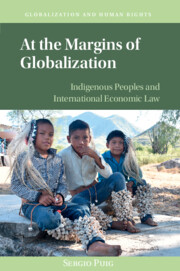Book contents
- At the Margins of Globalization
- Globalization and Human Rights
- At the Margins of Globalization
- Copyright page
- Dedication
- Contents
- Tables
- Preface and Acknowledgments
- Introduction
- 1 Globalization and Its Multiple Discontents
- 2 The Process of Susceptibility and Exclusion
- 3 Indigenous Peoples under International Economic Law
- 4 The Experience of Indigenous Peoples under Economic Regimes
- 5 The Recalibration of Indigenous Rights and Economic Law
- 6 Indigenous Interests and the Future of Economic Treaties
- 7 Toward an Indigenous-Based Critique of Globalization
- Conclusion
- Index
- Series page
1 - Globalization and Its Multiple Discontents
Published online by Cambridge University Press: 23 April 2021
- At the Margins of Globalization
- Globalization and Human Rights
- At the Margins of Globalization
- Copyright page
- Dedication
- Contents
- Tables
- Preface and Acknowledgments
- Introduction
- 1 Globalization and Its Multiple Discontents
- 2 The Process of Susceptibility and Exclusion
- 3 Indigenous Peoples under International Economic Law
- 4 The Experience of Indigenous Peoples under Economic Regimes
- 5 The Recalibration of Indigenous Rights and Economic Law
- 6 Indigenous Interests and the Future of Economic Treaties
- 7 Toward an Indigenous-Based Critique of Globalization
- Conclusion
- Index
- Series page
Summary
The main criticisms of globalization fail to fully capture the interests of indigenous peoples. On the one hand, the challenges based on relative gains rarely advocate from the perspective of indigenous peoples or take into account the experiences of these communities in their arguments. In general, these perspectives completely ignore both the specific protections of indigenous peoples and the ways in which these groups can effectively participate by integrating into a cosmopolitan community more welcoming of these experiences, often assuming that, as the relative losers, they are uninterested in incremental change and participation. This may not be true for all indigenous groups. On the other hand, perspectives based on absolute losses have been adopted by indigenous advocates who argue for systemic change, but fail to fully grasp this group’s interests. Regrettably, the sustainability perspective often disregards the interest of indigenous groups of participating in the gradual exploitation of their territories and resources.
Information
- Type
- Chapter
- Information
- At the Margins of GlobalizationIndigenous Peoples and International Economic Law, pp. 9 - 22Publisher: Cambridge University PressPrint publication year: 2021
